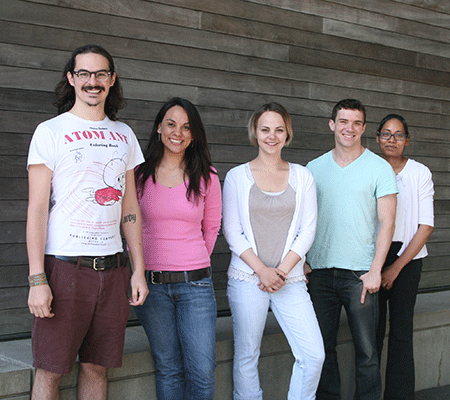(l to r) Gonzalo Gonzalez Del Pino, Carolina Salguero, Christina Saak, Kristian Herrera, and Victoria D’Souza
Since 2009, Summer Research Opportunities at Harvard (SROH) has hosted talented undergraduates from across the United States for a ten-week taste of life as an MCO graduate student. SROH (“ess-roh,” when spoken aloud) is a partnership between Harvard’s GSAS and The Leadership Alliance National Consortium, an organization dedicated to training and mentoring young scholars from ethnic, racial, and socioeconomic groups traditionally underrepresented in the sciences. Harvard sponsors several SROH programs, in psychology, social sciences, and the humanities, as well as a similar endeavor, SHURP, at the Harvard Medical School.
Each summer, MCO faculty, students, and members of the Diversity Committee collaborate to select six-to-nine promising young scientists and place each in a lab whose research compliments his or her own interests and academic background. Beginning in early June, SROH interns unpack in the Harvard undergraduate dormitories for a summer conducting research alongside graduate students, postdocs, and faculty and attending weekly seminars featuring informal faculty talks and mentoring sessions. Finally, students present their work at a Harvard-wide poster session and at the Leadership Alliance National Symposium.
While SROH’s primary objective is to invite undergraduates “to learn about a completely new field, to bolster their resumes, and to make valuable connections,” says Diversity Committee Chair Victoria D’Souza, the program additionally offers graduate students an enriching and inspiring opportunity as mentors and administrators. “The Diversity Committee currently plays a very limited ‘active’ role in running the program,” D’Souza testifies, “Thanks to the success of our graduate students, who are intimately involved in all aspects of the summer internship.”
Carolina Salguero, former SROH administrator, G4, and alumna of SROH 2009, believes that “One of the biggest drives for [SROH] is to create a student organization that allows graduate students to be more active in the recruitment of underrepresented minority students.” At the same time, Salguero and fellow student administrator Christina Saak, G4, ensure that the MCO students involved receive training in how to become good and better mentors.
For the administrative pair, the ten-week program entails a year-long commitment: In the fall, Saak and Salguero attend the leading minority conferences, ABRCMS and SACNAS, alongside MCO administrators and faculty in order to recruit both for SROH and the MCO program. They then review applications, organize seminars, outings, and activities, invite faculty speakers, enlist peer mentors for each intern, and finally return to conferences the following fall to check in with former interns and begin the process anew.
For student volunteers, participation in the program is not so time-consuming that they can’t take advantage of summer’s primetime for uninterrupted research. Seminars take place on Thursday evenings, so that mentors and mentees alike can still get in a full day’s work. Each week a different peer mentor leads the evening’s activities and orders dinner—take-out from any number of local eateries. “So they get to see what we eat on a daily basis,” Salguero laughs, “different tastes of what Cambridge is all about.” A faculty member delivers a short talk (“They’re welcome to take any of our dinner,” the SROH team offers magnanimously) that features an overview of their research, but also includes their personal story, a brief history of their path to Harvard, to demonstrate for interns (and graduate students) what various careers in science can look like.
Afterwards, mentors lead an activity designed to enhance scientific communication skills and help interns market themselves and their research as they begin their careers. Activities include lessons on abstract writing, designing and presenting a scientific poster, writing fellowship proposals, and, toward the end of the summer, composing personal statements for applications to graduate school.
As the interns head home, the mentors stay for their own training session. Saak and Salguero credit Tamara Brenner’s Life Sciences Mentoring Workshop as a vital source of both inspiration and information for coordinating these sessions. At this year’s first meeting, Tom Torello, MCB’s Assistant Director of Undergraduate Studies, advises graduate students how to write strong letters of recommendation.
This year, two new student administrators take over as the logistic center for SROH operations: Kristian Herrera, G4, and Gonzalo Gonzalez Del Pino, G2. Both look forward to gaining administrative experience that will eventually serve them in their careers, whether running a lab or legislating science policy. They’re also eager to share their own intellectual enthusiasm and gratitude for the opportunities that brought them here with another generation of scientists. In the meantime, Saak and Salguero are sticking around as peer mentors and advisors to the current administrators, but with graduation imminent, they feel it’s important to pass the torch and make sure it keeps travelling, so the program continues to thrive in the years to come.
In future, the SROH team aspires to increase both student and faculty involvement and hopes to engage a pair of faculty members to act as mentors of the mentors—the faculty’s experience mentoring graduate students on a daily basis could be an invaluable resource. In the meantime, Saak and Salguero agree that graduate student investment in the SROH program makes a powerful statement that students care about cultivating a diverse environment. They hope that, over the years, “having this student organization will [continue to] create more excitement for building a diverse community.”


